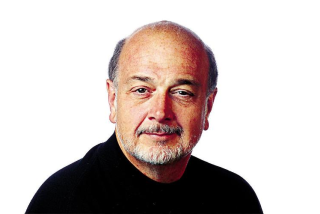Book Review : Focusing on Sports Scribe in Flashbacks
- Share via
The Sportswriter by Richard Ford (Vintage Books: $6.95)
It is tidy of Frank Bascombe, the garrulous narrator of “The Sportswriter,” to have his mid-life crisis at the age of 39. Life is supposed to begin at 40, after all; so there is still plenty of time. Nothing irrevocable has happened; you have a second chance.
This second chance asserts itself tentatively at the end of the book, but it has hung over the Easter weekend into which Bascombe’s crisis crowds itself, along with flashbacks of his life to that point. Its presence is undermining.
After following this ordinary sportswriter on his tour of quiet desperation, the reader might expect to see him marked by it. Not at all; it is a skin he sheds. Ex-wife, ex-lovers, dead child, dead friend, career and 39 years of “dailyness” lie there, drying out. Bascombe, fresh if wary, is off for a spot of beach-combing in Florida, and a painless alliance with a lush young medical student who admires his writing.
As a young man, Bascombe published a few well-received short stories. Then he found he had lost the curiosity about his characters that keeps fiction moving. He settled for the more guarded life of a magazine sportswriter; a job that gave him prestige, variety and the opportunity to live at the edge of things. Pursuing this edge, he moved out of New York to New Jersey, a state-sized suburb.
Twelve Years Later
Twelve years later, on the weekend where the book is set--except for the Florida postscript--the edge has become the precipice.
Bascombe’s work is little more than a comfortably evasive routine, though he asserts his contentment. He asserts so hard that we are made to feel the hollowness. Negation by assertion is the narrative’s central device, in fact; giving it flatness and a dead tone.
Bascombe’s wife left him after finding some letters from another woman; though not one of the several he had been unfaithful with. Their older son had died, marking a beginning to the drying-up process that was the real end of their marriage. They remain friends, he asserts, in a civilized arrangement that keeps her in the same suburb and allows him to see his remaining son.
Again, the assertion is like a bell tolling. So is Bascombe’s assiduous defense of life in suburban New Jersey. Poison ivy has a similarly specious sheen.
Overwhelms Events
The weekend events are intended to crystallize the chilly past. But the past is so extensively narrated and chewed over, that it overwhelms the events.
Early on Good Friday, Bascombe meets his ex-wife at the cemetery where their son is buried. It is an annual ceremony, and a dry one. Afterward, he goes to pick up Vicky, a cuddly but sensible Southerner who is much younger than he and, as he makes clear, not as well-educated. He takes her on a quick trip to Detroit, where he is to interview a crippled sports figure. It turns out that the sports figure is deranged as well as crippled, so the mission washes out.
So does his attempt to make a new start with Vicky. By the end of the weekend, he has had that fatal meal, Sunday lunch, at her parents’ house. The lamb is overdone, the conversation underdone, and the decor tacky; and the couple splits up. Vicky has the sense to realize she’s being patronized.
Finally, there is a suicide. An acquaintance who belongs to the same divorced men’s support group as Bascombe, had previously told him of a troubling homosexual encounter. Divorce has not so much freed him as undone him. He shoots himself, and Bascombe is summoned to tidy up. After which, he goes into New York, meets the medical student--she is working as an intern at his magazine--and is off to the future.
The point of “The Sportswriter” is not the plot, but the quality of thought and feeling with which the narrator assays his life. It is a dull point. Bascombe is not very nice and not very interesting. He takes complete possession of what he narrates, instructing the reader in the proper response to each of the characters he presents; and to himself.
Here is Bascombe on the need not to think deeply:
“Some things can’t be explained. They just are. And after a while they disappear, usually forever or become interesting in another way. Literature’s consolations are always temporary, while life is quick to begin again. It is better not even to look so hard, to leave off explaining. Nothing makes me more queasy than to spend time with people who don’t know that and who can’t forget, and for whom such knowledge isn’t a cornerstone of life.”
This is a square thought, cubed.
More to Read
Sign up for our Book Club newsletter
Get the latest news, events and more from the Los Angeles Times Book Club, and help us get L.A. reading and talking.
You may occasionally receive promotional content from the Los Angeles Times.






